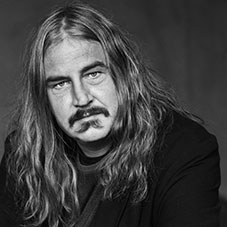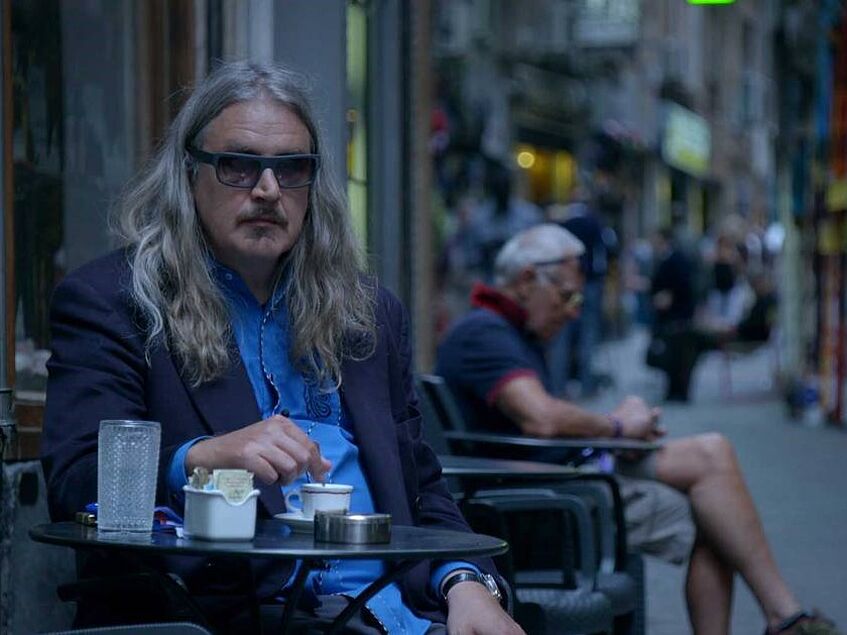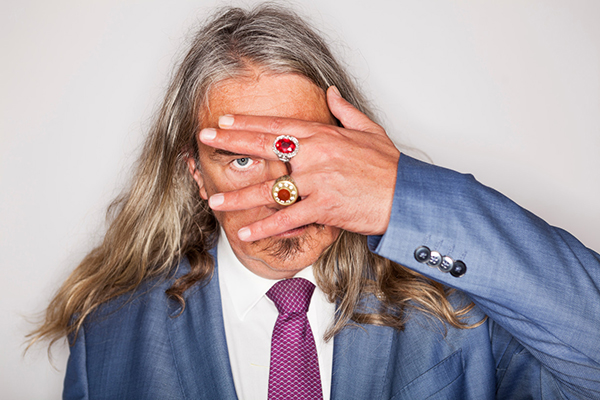Ilja Leonard Pfeijffer
Ilja Leonard Pfeijffer is a Dutch writer, poet and novelist. He wrote complex masterpieces that led him to international fame, such as Het ware leven, een roman (2006) and La Superba (2013). His innovative style led him to stand among the most thought-provoking and intriguing figures of the Dutch literary landscape. Thanks to the broad range of topics and genres he deals with in his books, he is one of the most award-winning modern writers of The Netherlands and the whole of Europe.
Unconventional Italian perspectives

Ilja Leonard Pfeijffer published more than forty books, challenging himself to write by trying different styles: poems, fiction, short stories, drama, essays, academic studies, articles, translations and anthologies are just some examples of his vast literary production. His appeal to curiosity and wonder stands out by blooming through his powerful style, an authentic mixture of modern and classical forms.
The reader stands fascinated and captured by the musicality and magnificence of his unforeseen writing. It is anything but hard to understand: the thought sweetly flows over the hundreds of black words in pages where every detail got gingerly thought. He lets the reader’s mind wander in the nowadays world, the one made out of doubts, fights, protests and rights. Still, Pfeijffer reminds us that we should always have a look back to our past, cherishing every step that led us where we are standing today.
In La Superba (2013), translated in Italian by Claudia Cozzi and published by Nutrimenti (2018), Pfeijffer handles contemporary topics, such as migration and society structures. In this novel, Pfeijffer lets us understand how deep his love for Italy is. No foreign author before him described Italy as it is, with his dark sides too. Italy is anything but the typically described country of cerulean blue sea, ever summery skies, molten yellow lemons and heavenly savoury food. He sees Genoa through the eyes of an Italian man, someone who has always lived there and is capable to uncover the beauty and the hidden flaws of contemporary society.
La Superba is somehow a political novel, too. The main character, Pfeijffer’s alter ego, is the archetype of any migrant coming to whichever city from a country with a different background and culture. However, this time the migration process is inverted: he comes from the North hoping to make a fortune in the South of Europe. Here lays yet another debunked myth: moving to a Southern place might be seen as a stepping stone for your working life. Pfeijffer dives into the migration issue exploring its historical dimension, too. Ever since the Middle Ages, Genoa has always been the dramatic heart of the movement towards horizons of hope.
"Abundantly rich in provocative thought."
- Anna Patterson about La Superba, World Literature Today -
This novel won several mentions, as the Libris Literatuur prize, the most important Dutch literary award, and the highly-esteemed Quinquennial Prize for fiction of the Royal Academy of the Dutch Language and Literature of Gand. The novel quickly became a bestseller, sold and translated in several countries such as the U.S., Germany and Italy, where it got in the final five European books for the Strega Prize.
The italian world at his feet
Pfeijffer stands out among the Italian audience for his undoubtedly fascinating fashion style. When strolling in Genoa’s narrow caruggi charm, you could easily glimpse a middle-aged man sitting at a terrace of a small café, sipping some rather amber-like drink and holding a cigarette between his fingers, lost in the intimacy and everyday life of the place. And you would be more than sure the man sitting at that café is Ilja Leonard Pfeijffer. He likes to define the terraces of the cafés as his “private offices”, from where he silently looks at the life surrounding him and lets his imagination flow behind the faces of unknown, ordinary people. He tries to guess the stories hiding behind those faces, which often are anything but anonymous. He thickly fills his notebooks with thoughts and ideas that sooner or later he transforms into borderline stories between facts and fiction ready-to-insert in his books. He would appear as a man who came directly out of his novels: long hair, moustache, suit, silk ties with vintage-like golden clips. Anyone would stand mouth wide open simply by his appearance, which oozes an intriguing personality, the one of somebody who knows his mind.
At the very end of 2018, he had the (Italian) world at his feet: this happened when his five-star and most recent novel Grand Hotel Europa was released. It was published in Italy by Nutrimenti (2020), translated by Claudia Cozzi and immediately achieved resounding success all over the country. This novel shows how deeply Pfeijffer is committed to current affairs and contemporary society. It shows the complex relationship between fantasy and reality in love and belief, too. The main topic he deals with is love. He depicts its role in present-day society and finds some interesting connections with mass tourism. Also, he brings up thorny subjects as European identity, homesickness and the inevitable end of an era. The references to Venice and the Italian culture and history are, of course, multiple. The most significant example in this matter is Abdul, the bellhop of the Grand Hotel Europa. Pfeijffer wisely compares the man to Enea, the main character of Virgilio’s Eneide, for his bravery to escape an unsafe place and get to the “Belpaese”, which he sees, as Enea did centuries ago, his new and “promised land”.

Tourism always stays depicted as a bad habit that will sooner or later guide us towards the irreversible destruction of cities, communities and humanity. From this point of view, Pfeijffer wishes the pandemic that has been hitting the world for the past two years becomes beneficial in a certain way. He indeed hopes this situation of uncertainty and lockdown purely shows how fragile a tourism-based monoculture, like the one of Venice, is and could easily and quickly fall. In this gloomy atmosphere, a ray of hope sparks through a kind of irony: the actual Italian perspective. Pfeijffer brilliantly describes Italian and foreign habits with a dash of critic which turns into comedy when he talks about Italian culture.
“ Pfeijffer’s voice, astonished, sensual and disarmed when he rethinks Clio, harsh and judgmental when he analyzes those who move only to find confirmation of their own prejudices, sympathetic and admiring in listening to Abdul, becomes almost tender and lyrical in his lovesong for the old continent. […] Just enter the majestic lounge of the Grand Hotel Europa and you will know that not even a second will be wasted.”
– Il Piccolo (Italy)
The borderline between facts and fiction finely emerges in all of Pfeijffer’s novels. In this matter, Grand Hotel Europa, however, sparked a different light on the audience. He juggles endlessly between facts and fiction by using the names of real people in fictitious situations. However, real-life is never domesticable to your heart’s content, and it could take its toll. That is what happened when Pfeijffer got one of his book presentations at Venice University cancelled after using the name of Paola Marini, former director of Gallerie dell’Accademia in Venice, as the name of the fictional powerful rival woman. Pfeijffer assures the woman in the book is not the direct copy-paste of Paola Marini; still, the question got to court. Everything with a slight facts-taste could turn out convenient to make the fiction illusion more truthfully. In this book, we find other notable figures mentioned, as the French essayist Jean Clair, the director of Vatican Museums Antonio Paolucci, and the director of Uffizi Gallery in Florence Eike Schmidt. But, while Pfeijffer refers to these last two men in a confidential and friendly atmosphere, he puts Paola Merini in a bad light, depicting her as jealous and tyrannical. From that moment on, our adopted Dutch writer always had to specify that the facts told in the book were just a figment of his imagination.
The book has been rejoiced in the Dutch and Belgian press and has instantly become a bestseller. Grand Hotel Europa was the most sold book in The Netherlands in 2019 with more than 250.000 copies, and its translation rights got adopted in almost 15 countries.
Italy and the Netherlands

His commitment to contemporary society shows off from his opinion articles too, and in some interviews, he gave in the past half a year about the EU recovery fund. In the past year, the tension between Italy and The Netherlands went sky-high. Pfeijffer found himself standing in an inconvenient situation, having to choose which side to stand. He often mentions the typical «Dutch superiority complex»: Dutch people are the only ones who do not have anything to improve or learn from other countries. However, this is just a clear example of the sort of parochialism everyone of us knows. We somehow always feel attached to our own country, our «real» and home one, although we are progressively getting open-minded while widening our horizons towards other countries and cultures. Pfeijffer feels like being a perfect migrant in the south of Europe, but the kind of perfectly integrated migrant. He is true to his homeland, The Netherlands, but, as he shows in his two masterpieces La Superba and Grand Hotel Europa, he always keeps in mind the importance of communion with “the Other”.
(Maddalena Simondi)
